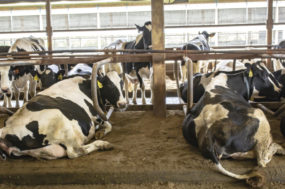More than 1,000 farmers, nutritionists, feed mill managers, students and journalists attended a lecture tour in January that focused on the effects of ethanol production on the animal feeding industry.
The tour, titled “An Industry in Crisis,” was sponsored by Alltech and visited cities throughout the United States and Canada. Alltech president and CEO Pearse Lyons and other company managers discussed rising corn prices and feeding strategies for distillers grains.
“An industry under crisis? Of course, it’s not an industry under crisis, but in 1980 it was $2 a bushel for corn. But today it was $3.65 a bushel in Chicago. So something dramatic has happened,” said Lyons.
Lyons said estimates show that by 2025 the United States will produce 37 billion gallons of ethanol. To produce this amount, about 370 million tons of corn would be needed for ethanol plants alone. Lyons said this harvest would be 120 million more tons of corn than was produced this year, which was the third-largest corn crop in history and the second-highest yield in history. Analysts predict the ethanol industry will pull 139 million tons of corn from the 2008 harvest.
“This is a problem not only for today, but for tomorrow and for years to come,” said Lyons.
Lyons said when a new ethanol plant is announced in a dairy producer’s area, a producer should pay attention to the plant’s byproducts – wet and dry distillers grains.
“As these distilleries come in, we should embrace them. We should say, ‘We don’t just want you making ethanol. We want you to be making ethanol as a byproduct.’ And the main product should be materials for you and I,” said Lyons.
He said one day the profit margin for ethanol would come down.
“Ethanol is a commodity, and prices will come down. But the distilleries of the future will sink or swim based on what they get for their distillers grains. And you will sink or swim based on how you use those distillers grains and how they make them,” said Lyons.
After attending the tour, dairy producer Dean Swager of Buhl, Idaho, said he thinks the conference’s title may be overexaggerated, but still worth acknowledging.
“They’re right, but probably not totally,” said Swager. “We are going to have to rethink how we feed cows.” PD




